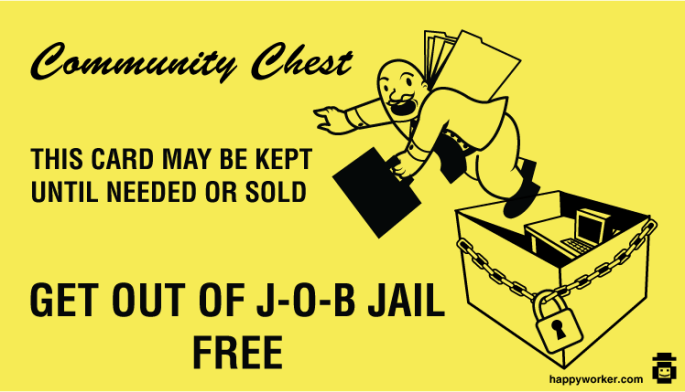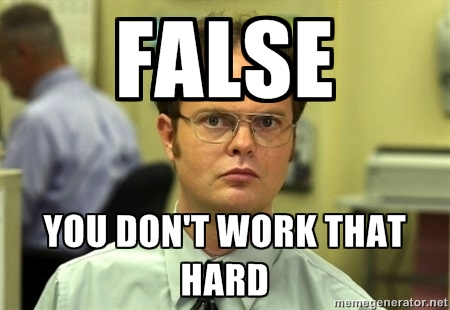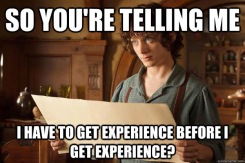Liking a job you have is great. Loving it is even better. I am a firm believer in the theory that liking your job is one thing but liking your coworkers and management team is even better. If you work in a place where you have both that’s even better. Consider yourself very, very lucky because not everyone has that type of position.
But…. I think it’s important to understand when a job is truly just a job and when it might be time to leave.
Last September when I first got this blog up and running 🏃, I was in the process of changing jobs. Now the job I held previously was in the HR field but in the education system. I absolutely loved this job. I couldn’t (and still couldn’t) have a single negative thing to say about that job. I loved what I was learning and how quickly I was able to learn. Others were patient and willing to train/teach. There (down the line) might have even been opportunities to take classes for a reimbursement! When I say this place was great I mean it. Total office job with holidays and weekends off. Thus far in my very short career it was by far the least stressful. Not only did I understand the content of my duties, but I had support. I could go on, but I think you get my point.
Around this time last year, I was informed that would be unable to keep my position (some civil service laws/rules, I won’t bore you with the details). I was devastated at first. So upset that I had to leave. My boss was so nice that he offered me a part time position while I was in between jobs. Something he did not have to do but make it work for me.
Once I had found a new job (my current position), I still wasn’t happy that I couldn’t stay, but I adjusted quickly and took on my new job as I had any other. Each new day at my new job, I became more energized by what I was responsible for. Being with a start up company, I had different responsibilities flying at me all the time. In my ever adapting evironment, I was learning more about the HR world in just a few weeks, than I had learned over the course of a year at my previous job. After six months I got promoted to a talent recruiter. Now being a talent recruiter, I have a huge challenge in front of me. This role (at times) can be very intimidating and overwhelming, because it is so new. I am bound and determined to achieve and do great things in my new role which is pushing me to work harder, ask more questions and even try new things. The exponential growth I’ve been exposed to is worth leaving my previous position. Moreover, I don’t think it is something I would have done on my own for quite a few years because it was such a comforting position. I know now that being eliminated from my previous position was a blessing. It has helped pushed me into starting my master’s program to move into higher education.
Without my job being taken out from underneath me, I would have gotten comfortable and complacent. My advise to you, NEVER let yourself get complacent with your current job. Even the day I find myself in Higher Education, I still want opportunities to learn more. Always strive for me, or you’ll end up like I almost did. Comfortable. Comfort is great and stress relieving, but I promise, it is not career building.
Don’t believe that this is possible? Read this article.
#kbk, until next time




 shut down when the going gets tough. If you work somewhere for a few years, it shows them that your able to stick to something. Employers simply cannot invest in training and paying someone (even if they are the most qualified for the job), just to have then quit and start the process all over again.
shut down when the going gets tough. If you work somewhere for a few years, it shows them that your able to stick to something. Employers simply cannot invest in training and paying someone (even if they are the most qualified for the job), just to have then quit and start the process all over again.


 course work will give you a chance to explore some of that. Specifically, you will study areas of the brain that involve speech and memory. You’d be quite surprised in everything involved in forming just one sentence and saying it aloud. You want to be a people person as well, in order to be energized by this career. You’ll work extensively with people and you’ll want be helping them through some difficult issues in their lives. This can be a rewarding field, but you have to enjoy helping people. Patience is key!
course work will give you a chance to explore some of that. Specifically, you will study areas of the brain that involve speech and memory. You’d be quite surprised in everything involved in forming just one sentence and saying it aloud. You want to be a people person as well, in order to be energized by this career. You’ll work extensively with people and you’ll want be helping them through some difficult issues in their lives. This can be a rewarding field, but you have to enjoy helping people. Patience is key!





 a you’re telling me I need experience to get a job, but I need a job to get experience… catch 22″. I get what your saying, but from my research your three years of experience comes from entry level positions. You’d be finding those entry level positions working alongside arborist, in the industry to then become an arborist yourself. It’s like most careers, as you have to start from the bottom and move up in the world. Don’t get discouraged by these requirements, it’s called career building. Being an apprentice is part of your new career in arborism. This is why it is important to keep your focus on pullers.
a you’re telling me I need experience to get a job, but I need a job to get experience… catch 22″. I get what your saying, but from my research your three years of experience comes from entry level positions. You’d be finding those entry level positions working alongside arborist, in the industry to then become an arborist yourself. It’s like most careers, as you have to start from the bottom and move up in the world. Don’t get discouraged by these requirements, it’s called career building. Being an apprentice is part of your new career in arborism. This is why it is important to keep your focus on pullers. Remember when she was instructing 2nd years’ how to replant mandrakes (screaming plants)? You personally wouldn’t be dealing with screaming plants, but without the proper care and knowledge, your garden might be screaming for some love and attention. If you have a knack for working with plants, vegetation or any combination of the two you may want to consider a career in it. I’ll let you take a look at the Michigan State University page about
Remember when she was instructing 2nd years’ how to replant mandrakes (screaming plants)? You personally wouldn’t be dealing with screaming plants, but without the proper care and knowledge, your garden might be screaming for some love and attention. If you have a knack for working with plants, vegetation or any combination of the two you may want to consider a career in it. I’ll let you take a look at the Michigan State University page about 






